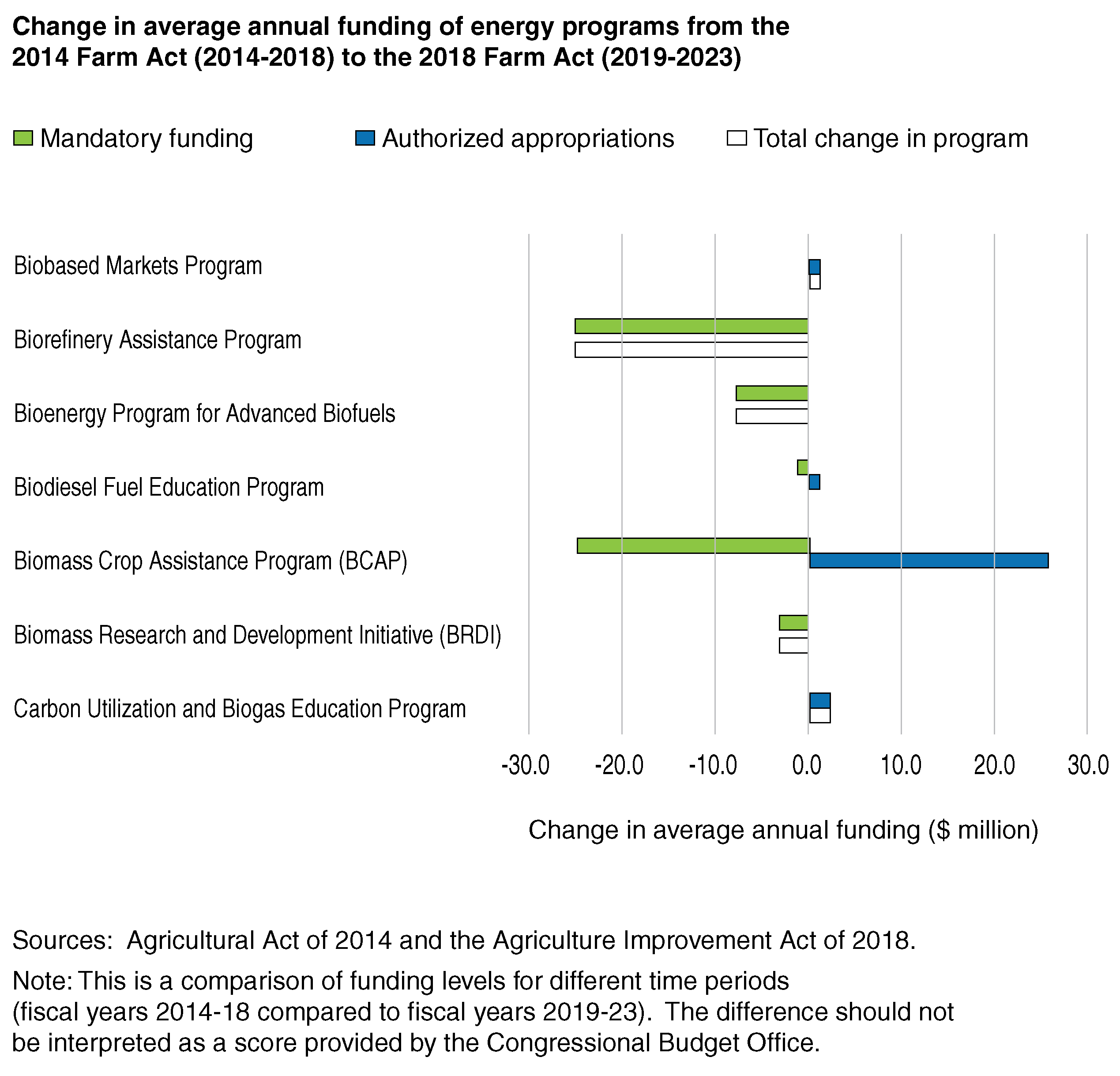Energy: Title IX (Energy) and Title VII (Research)
Encourages investments in alternative energy technology and production of renewable biomass for biofuels through education, research, and financial assistance programs; encourages the manufacture and production of other renewable biochemical and biobased products through Federal procurement and financial assistance programs.
Highlights
- For energy-related programs, the Agriculture Improvement Act of 2018 (2018 Farm Act) authorizes appropriations of $835 million over 5 years, an increase over the $690 million authorized in the Agricultural Act of 2014 (2014 Farm Act). In contrast, mandatory funding over 5 years is $375 million in the 2018 Farm Act, about 55 percent of the $685 million provided by the 2014 Farm Act. Total 5-year funding for energy programs (mandatory funding plus authorized appropriations) declined from $1,375 million under the 2014 Farm Act to $1,210 million under the 2018 Farm Act.
- The Biorefinery Assistance Program is expanded to assist producers of any combination of advanced biofuels, renewable chemicals, or biobased products.
- A new Carbon Utilization and Biogas Education Program will promote benefits of permanent carbon sequestration, carbon dioxide utilization, and aggregation of organic waste from multiple sources into a single biogas system.
- Algae is included as an eligible feedstock under the Biomass Crop Assistance Program (BCAP).
New Programs and Provisions
Biobased Markets Program— Realigns the program into the Rural Development mission area. Continues to promote renewable products through the “USDA Certified Biobased Product” label and certify eligibility for Federal procurement preference. Qualifying product and process definitions are expanded to include renewable chemicals and intermediate ingredients. Establishes expedited approval processes and streamlined procedures for product designations.
Biorefinery Assistance Program—Continues to provide loan guarantees for development, construction, and retrofitting of commercial-scale biorefineries. Program changes, to be implemented in FY2019, expand the definition of “eligible technologies” to include technologies that produce one or more or a combination of advanced biofuels, renewable chemicals, or biobased products. All biobutanol manufacturers qualify for the biorefinery assistance program, regardless of what feedstock is used.
Bioenergy Program for Advanced Biofuels—Continues to authorize appropriations of $20 million per fiscal year for 2019 through 2023, and sets mandatory funding at $7 million per fiscal year, down from the $15 million for 2014 to 2018.
Biodiesel Fuel Education Program—Authorizes appropriations of $2 million per fiscal year 2019 through 2023, up from $1 million per fiscal year, but discontinues the $1 million in mandatory funding provided annually from 2008 to 2018.
The Rural Energy for America Program—Continues assistance to agricultural producers and small businesses in rural America for adopting renewable energy and improving energy efficiency. Adds loan guarantees to agricultural producers to install energy efficient equipment or systems for agricultural production or processing. Mandatory funding remains at $50 million per fiscal year; authorized appropriations continue at $20 million per fiscal year.
The Biomass Crop Assistance Program (BCAP)—Continues financial assistance to owners and operators of agricultural and non-industrial private forest land who establish, produce, and deliver biomass feedstocks. Algae is now included as an eligible feedstock under the program. BCAP provides two categories of assistance: payments for establishment and production of biomass feedstocks and payments for collection, harvest, storage, and transportation of biomass feedstocks to qualified conversion facilities. Mandatory funding ($25 million annually under the 2014 Farm Act) is not continued. Annual appropriations of up to $25 million are authorized for fiscal years 2019-2023.
The Biomass Research and Development Initiative (BRDI)—Relocated from the Energy Title to the Research Title. This provision provides grants to companies, universities, and government research centers to conduct research and development (R&D) and demonstration projects on new ways to refine various types of feedstocks into biofuels or biobased chemicals and products. The 2018 Farm Act amends the definition of “biobased product” to include carbon dioxide intended for permanent sequestration that is a byproduct of certain commercial and industrial products. Mandatory funding of $3 million per fiscal year is eliminated and authorized appropriations of $30 million per fiscal year continue for 2019 through 2023.
The Carbon Utilization and Biogas Education Program—Authorizes appropriations of $2 million per fiscal year for 2019 to 2023 to (1) provide education to the public about the benefits of permanent sequestration or utilization of carbon dioxide (from the production of a biobased product), or (2) provide education to agricultural producers about opportunities for aggregation of organic waste from multiple sources into a single biogas system. Establishes an Interagency Biogas Opportunities Task Force building upon the existing Biogas Opportunities Working Group.
Repealed Programs and Provisions
- Repowering Assistance Program is repealed.
- Rural Energy Self-Sufficiency Initiative is repealed.
Economic Implications
The Agriculture Improvement Act of 2018 significantly reduces mandatory funding while increasing authorized appropriations for energy programs. These changes will reduce the certainty of funding for these programs because a larger share of funding is dependent on annual appropriations. Specifically,
- Mandatory funding was eliminated for the following programs: Biomass Crop Assistance Program (previously $25 million per fiscal year); Biomass Research and Development Initiative (previously $3 million per fiscal year); Biodiesel Fuel Education Program (previously $1 million per fiscal year). Mandatory funding in the Bioenergy Program for Advanced Biofuels is reduced from $15 million to $7 million per fiscal year.
- The Biobased Markets Program is expanded. Mandatory funding at $3 million per fiscal year 2019 through 2023 remains the same, but authorized appropriations increase from $2 million to $3 million per fiscal year.
- The Biorefinery Assistance Program includes $50 million in mandatory funding for 2019 and $25 million for 2020 (previously a total of $200 million across fiscal years 2014 through 2016), and authorizes appropriations of $75 million per fiscal year to continue through 2023.
- Appropriations of $25 million annually are authorized for the Biomass Crop Assistance Program for fiscal year 2019 through 2023, but mandatory funding is eliminated.

